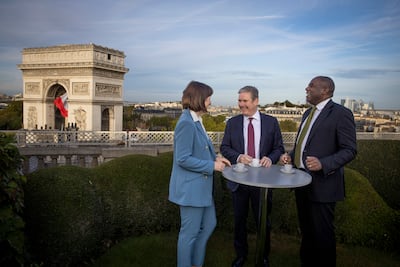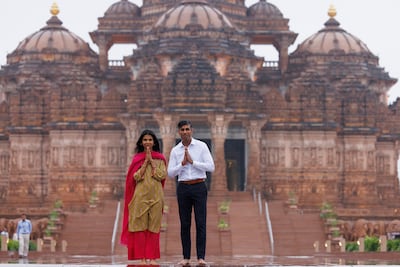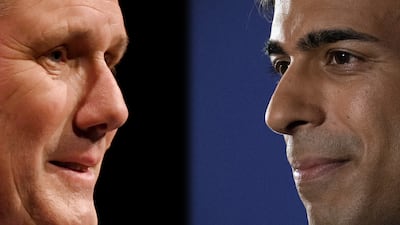Labour leader Keir Starmer would do a better job on the world stage than British Prime Minister Rishi Sunak, an exclusive poll carried out by The National has found.
The Deltapoll survey of 2,039 British adults asked respondents to choose whether Mr Starmer and Mr Sunak would “do the better job of representing the United Kingdom on the world stage”.
While 31 per cent were in favour of Mr Sunak, a larger number supported the opposition leader, with 40 per cent believing he would excel in the international arena.
Mr Sunak's net poll ratings across a range of issues were largely in negative territory. The government's approach to the war in Ukraine was a bright spot, with net support of 64 per cent backing Russian sanctions and 46 per cent net endorsing support for Ukraine.
Overall, 78 per cent of respondents backed a separate question on Russian sanctions, with 43 per cent accepting the measures even if they caused a rise in the cost of living.
Mr Sunak is doing the wrong thing when it comes to a host of policies, including the economy (62 per cent), the cost-of-living crisis (68 per cent), making the most of Brexit, (53 per cent), immigration (67 per cent) and crime (54 per cent).
Tackling immigration produced the worst net tally for Mr Sunak, with only 19 per cent endorsing his approach – a net deficit of 48 per cent. Handling the economy was not rated much better, with a 46 per cent net gap.
World stage
Mr Starmer’s recent trips to France and Canada had presented him as a “credible foreign policy actor,” said Olivia O’Sullivan of the Chatham House think tank.
By contrast, Mr Sunak was more focused on the domestic agenda without, as yet, providing a significant global presence despite trips to the G7 and G20 summits. He also only attended the Cop27 climate summit in Egypt after coming under significant public pressure, she added.
Jeremy Black, a foreign policy commentator, put the rating down to people “criticising incumbent governments” and that “Starmer is being given a free ride because he appears different” with his international standing untested.

Trump 'bad'
The poll also looked at US leadership. While the British public remain unimpressed by President Joe Biden’s leadership, it is far less enamoured by the prospect of Donald Trump returning to the White House, with 68 per cent stating he would do a “bad job”, the Deltapoll findings showed.
While Mr Trump still attracts a considerable following in America, he remains resolutely unpopular on the other side of the Atlantic. The poll found that 52 per cent said he would do a “very bad” job as president and 16 per cent “fairly bad”.
Polling in America shows the electorate evenly split, but if the British could vote for a US president, Mr Biden would win substantially, with 58 per cent, and Mr Trump trailing at 21 per cent.
Prof Black argued that there was “no doubt that people realise Trump poses many problems for his allies because of his unpredictability”.
Ms O’Sullivan agreed, stating that from Britain’s perspective, the prospect of another Trump administration was seen “as another sign of global insecurity, further instability and unpredictability”.
Biden split
But Mr Biden is still not viewed as an inspirational leader, with the vote split on 40 per cent each on whether he would do a good or bad job if he won another term next year.
More than half (55 per cent) also said Britain still shared a “special relationship” with America and three-quarters said Britain had a good or “very good” relationship with the US.
Prof Black suggested that the results were largely due to the cultural similarities which made British “pro-American irrespective of how we're getting on with Washington”.
“We’ll still watch big blockbuster Hollywood films such as Barbie and Oppenheimer, despite who's president,” he said.
Asked if they thought America was “generally headed in the right direction, or do you feel things are off on the wrong track”, 50 per cent stated the latter while only 23 per cent thought it was on a positive track.
Happy EU
The EU also fared well, with a plus 15 per cent next positive rating, as did India, with a plus 35 per cent rating.
The good relations between Britain and mainland Europe were in part due to the Ukraine conflict uniting the continent, said Charlotte Leslie, director of Conservative Middle East Council.
“Conflict makes people look to who their friends really over differences that may have seen more seemed more important ten years ago,” she said. “I think it's really encouraging because that's exactly the attitude we should be having towards our European friends as it's been a really tough few years since the Brexit vote.”
Ms O’Sullivan, Chatham House’s director of UK in the World Programme, said the results were “very interesting” and demonstrated the close security relationships with Europe was “common sense to a lot of British people”.
The royal family in particular has strong European ties, as demonstrated by King Charles III’s recent successful visit to France.
“That relationship is enduring, even if the political turmoil has made it difficult in the past few years,” Ms O’Sullivan said.
But she agreed that it was “the broader security geopolitical issues that the whole of Europe including the UK faces” that had led to a more positive view.
The majority of respondents also said that Britain had either a “good” or “very good” relationship with the UAE and Saudi Arabia.
Unsurprisingly, given its actions in Ukraine, Russia had a minus 75 per cent positive rating, while China had a negative 34 per cent rating.

Commonwealth’s future
More worryingly for both the government and British royal family, a majority of respondents (39 per cent) stated that they did not think the Commonwealth would exist in 50 years, as opposed to 35 per cent who thought it would.
Ms O’Sullivan argued that much of the Commonwealth’s future depended on the king’s plans and his ideas to revitalise the group.
“But the most interesting question is what Commonwealth countries think about Commonwealth,” she added.
The fieldwork was conducted between September 11 and 15.


